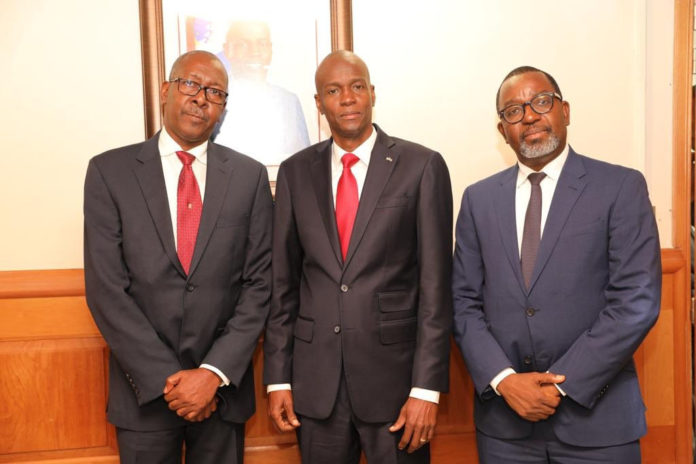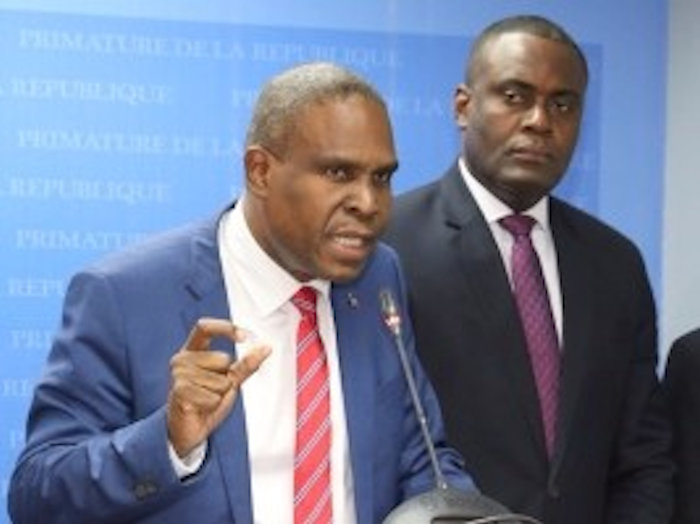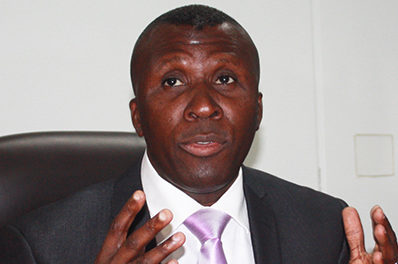
With less than 22% of the electorate voting, former President Michel Martelly’s protégé businessman Jovenel Moïse won a controversial first-round victory in the Nov. 20, 2016 presidential election. Resulting over-confidence may explain his arrogance, flippancy, boondoggles, straight-faced lies, and absurd declarations in the first 17 months of his five year term.
But a virulent uprising over fuel price hikes in July and last Wednesday’s giant march in the capital (and almost all provincial cities) to demand answers and justice for the disappearance of hundreds of millions of dollars of Venezuela-provided PetroCaribe funds has thrown the Haitian government into disarray and crisis.
Last year, Moïse was openly belittling the looting of the PetroCaribe fund and sabotaging Parliamentary probes. Now completely on the defensive, he is championing an investigation.
On Oct. 22, Moïse fired his right-hand man, chief of staff Wilson Laleau, as well as the Secretary General of the Presidency, Yves Germain Joseph, due to their alleged involvement in the expanding PetroCaribe corruption scandal.
They are to be replaced, respectively, by businessman Nahomme Dorvil and former National Palace accountant Jean Hilbert Lebrun.
it is clear that Moïse and Céant are trying to get out in front of a looming wave of protests which shows all signs of growing in size and momentum
“The president has decided to rid the environment of people linked to Petrocaribe without admitting they are guilty of anything,” said new Prime Minister Jean-Henry Céant (his predecessor, Jack Guy Lafontant, was forced to resign a week after the July riots). “The courts will decide who is guilty and who is not.”
In addition to those two Minister-ranking officials, Moïse axed 16 with the title of “presidential advisor,” Haiti’s principal patronage post. Among them are prominent, perennial right-wing spokesmen like former International Republican Institute (IRI) operative Stanley Lucas, Advisor on Foreign Policy, External Aid, and Direct Foreign Investment; Duvalierist lawyer Reynold Georges, Special Advisor on Judicial and Political Affairs; former Haitian Army officer and Justice Minister Jean Renel Sanon, Advisor on Intelligence and Security; former Senator for the Struggling People’s Organization (OPL) Andris Riché, Political Advisor; and former journalist Lucien Jura, a Martelly and Moïse official spokesman and Communications Advisor.
Although they’ve been terminated, the presidential advisors may be reappointed down the line. Moïse’s main purpose, in neo-Duvalierist tradition, is to give the impression of big change because heads are rolling.
But the Haitian masses clearly see that the firings are completely cosmetic, which will likely encourage them to ever greater protests, like the next nationwide PetroCaribe march on Nov. 18, the 215th anniversary of the Battle of Vertières, in which Haitians won their independence from France.

Also on Oct. 22, Prime Minister Céant announced that he is forming an “Independent Commission to Research the Truth” which would include “Civil Society personalities” and “be assisted by a foreign accounting and auditing firm.”
Among the groups he tweeted he hopes to attract to his initiative are representative from the likes of “the ANMH [National Association of Haitian Media], Chambers of Commerce, the PetroCaribe Challenge movement, the [lawyers’] bars of the republic, etc..”
But spokespeople for the PetroCaribe Challenge movement behind last week’s marches flatly rejected the invitation saying they wanted to see those responsible for the huge theft “tried and convicted.”
The ANMH and the Association of Haiti’s Independent Media (AMIH) also backed away from Céant’s invitation, calling it “inopportune,” and even the Catholic Church, a regular participant in such charades, has expressed its reluctance.
As for the proposal that a “foreign accounting and auditing firm” investigate the PetroCaribe fund, Haitian blogger Dady Chery points out that this was the proposal of the U.S. establishment’s right-wing Heritage Foundation in September. “No one asks where a private U.S. conservative think tank got the authority to demand a probe into a bilateral deal between Haiti and Venezuela,” she wrote on her blog, Haiti Chery, suggesting it would be an attempt by Washington to “implicate Venezuelan officials in the corruption” and thereby force cornered Haitian officials to “join the move to condemn Venezuela’s elections.” Such tactics could help bring “the downfall of Venezuela [which] would be a tragedy for all Latin America and the Caribbean,” she writes.
Meanwhile, Port-au-Prince prosecutor Clamé Ocnam Daméus has begun his own crusade into the PetroCaribe fray, summoning former Prime Minister Laurent Lamothe for questioning on Tue., Oct. 23. (For a second time, Lamothe did not show up, this time due to a lawyers strike, his lawyers said at the court.) On Wed., Oct. 24, Daméus will question Patrice Milfort, who heads General Construction S.A,, one of the major contractors for PetroCaribe projects.

But Sonel Jean-François, the former head of Haiti’s anti-corruption office UCREF, called Daméus’ inquest an “illegal and demagogic-political approach,” because the PetroCaribe matter is already being investigated by an examining magistrate.
“This decision by the state prosecutor has no legal basis,” Jean-François said. “If Mr. Ocnam Clamé Daméus dares to arrest any person in connection with this case, he will automatically make that person innocent. That’s the danger… Legally, Mr. Daméus has no right to take any parallel action while the investigating judge looks into the Petrocaribe case that is pending.”
The Moïse government has told the Superior Court of Accounts and Administrative Litigation (CSCCA) to investigate the PetroCaribe dossier and “the body has pledged to release its work in early 2019,” explains Jake Johnston on the Haiti Relief and Reconstruction Watch blog on Oct. 16. “However, there are reasons to be skeptical that this can lead to accountability. To begin with, the CSCCA is responsible for approving government contracts, meaning that the body now set to investigate is the one that already signed off on most of the contracts in question. Further, many question the ability of the CSCCA, or of any governmental body, to adequately and independently investigate.”
the body now set to investigate is the one that already signed off on most of the contracts in question.
But, Johnston continues, “perhaps most importantly, the CSCCA has already produced a report on a limited amount of Petrocaribe spending and despite finding significant problems, nothing was ever done to follow up. In fact, it was the work of the CSCCA that originally provided the basis for the Senate to investigate Petrocaribe. By kicking the investigation back to the court, the cycle of investigation continues, while the prospect of real accountability dithers.”
Then on Oct. 23, it was reported that four gunmen fired on the white Toyota Land Cruiser of Joverlin Moïse, President Moïse’s son, as the vehicle drove down Port-au-Prince’s Nazon road. The young man was not in the bullet-proofed vehicle, which sustained some bullet holes. The government sought to play down the incident, issuing a statement for “the population not to give in to disinformation practices that have become commonplace in recent times in the country.”
As we go to press, it is unclear who or what was behind this shooting. But it is clear that Moïse and Céant are trying to get out in front of a looming wave of protests which shows all signs of growing in size and momentum, possibly threatening the regime’s survival. The call for Jovenel Moïse’s resignation is a universal refrain in the demonstrations and on the radio.
After obstructing the investigation a few months ago, on Oct. 18, the day after the protest, Jovenel Moïse tweeted that he had instructed Céant to mobilize “the judicial apparatus so that light can be shed on the use of the PetroCaribe Fund. Nobody will escape justice.”
As someone who came into office indicted for laundering millions which many suspect were siphoned from the PetroCaribe Fund, that is one tweet Jovenel may someday regret.












